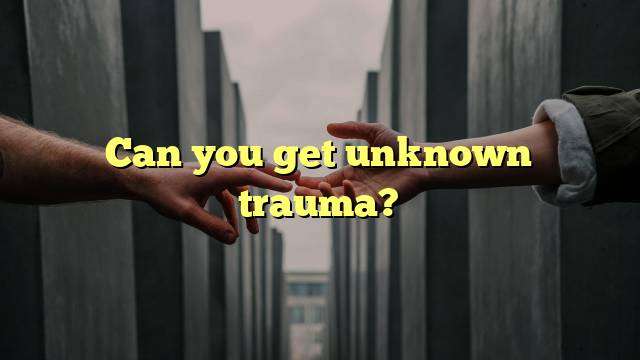Can You Get Unknown Trauma?
Trauma is an emotional response to a shocking, dangerous, or life-threatening event. It can be caused by a single incident or multiple incidents that occur over time. Trauma can be physical, psychological, or both.
Many of us have experienced trauma in our lives, whether it is the result of a natural disaster, a car accident, or a violent act. In most cases, we are aware of the trauma and can recognize the signs and symptoms. But what about those times when we may not be aware of the trauma that has occurred and can’t recognize the signs and symptoms?
Recent research by UCLA psychologists suggests that adults can develop symptoms of post-traumatic stress disorder (PTSD) even if they have no explicit memory of an early childhood trauma. This is known as unknown or latent trauma.
What Is Unknown Trauma?
Unknown trauma is trauma that is not consciously remembered or recognized. It can be the result of an event or series of events that occurred in childhood and was never processed or dealt with in a healthy way.
Unknown trauma can manifest itself in various ways, such as anxiety, depression, anger, and more. It can also manifest itself in physical symptoms such as headaches, stomachaches, and fatigue.
How Can You Recognize Unknown Trauma?
The first step in recognizing unknown trauma is to be aware of it. Pay attention to your thoughts and feelings and recognize when something is not quite right. Identifying the signs and symptoms of unknown trauma can help you to better understand and address the issue.
Some common signs and symptoms of unknown trauma include:
- Intrusive thoughts – recurring thoughts or images that are intrusive and unwanted.
- Flashbacks – re-experiencing the trauma in the form of vivid memories or nightmares.
- Hypervigilance – feeling constantly on guard, as if you are expecting something bad to happen.
- Avoidance – avoiding anything that may trigger the trauma, such as people, places, or activities.
- Negative self-talk – negative thoughts about yourself or the world around you.
- Anxiety – feeling anxious or on edge, even when there is no immediate danger.
- Depression – feeling down or hopeless.
If you recognize any of these signs and symptoms in yourself, it may be a sign of unknown trauma. It is important to seek help from a mental health professional to work through your trauma and develop healthy coping strategies.
How Can You Treat Unknown Trauma?
Treating unknown trauma involves a variety of techniques and approaches, including:
- Cognitive Behavioral Therapy (CBT) – this form of therapy helps to identify and challenge negative thoughts and beliefs that may be contributing to the symptoms of trauma.
- Eye Movement Desensitization and Reprocessing (EMDR) – this form of therapy involves focusing on a traumatic memory while also focusing on an external stimulus, such as eye movements or tapping.
- Meditation and Mindfulness – these practices can help to reduce stress and anxiety, allowing you to be more present in the moment and better manage the symptoms of trauma.
- Trauma-Focused Therapy – this type of therapy focuses on the traumatic event and helps you to process and make sense of it.
The treatment of unknown trauma is a process and can take time. It is important to be patient with yourself and to trust in the process. Working with a mental health professional can help you to develop the skills and strategies you need to recognize and manage the symptoms of trauma.
Conclusion
Unknown trauma is an emotional response to a shocking, dangerous, or life-threatening event that is not consciously remembered or recognized. It can manifest itself in various ways, such as anxiety, depression, anger, and physical symptoms. Recognizing the signs and symptoms of unknown trauma can help you to better understand and address the issue. Treating unknown trauma involves a variety of techniques and approaches, such as cognitive-behavioral therapy, eye movement desensitization and reprocessing, meditation and mindfulness, and trauma-focused therapy. Working with a mental health professional can help you to develop the skills and strategies you need to recognize and manage the symptoms of trauma.
